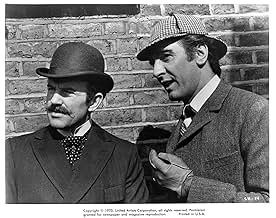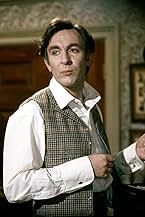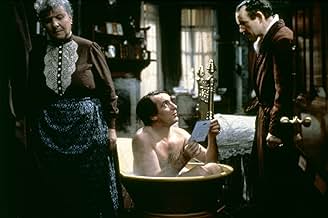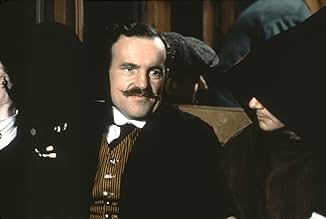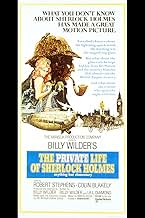IMDb रेटिंग
7.0/10
14 हज़ार
आपकी रेटिंग
जब ऊबा हुआ होम्स व्यग्रता से गेब्रियल वेलाडोन पर हमला होने के बाद उसके मामले को लेता है, तो उसके लापता पति की तलाश उसे लोस नेस और महान राक्षस की ओर ले जाती है.जब ऊबा हुआ होम्स व्यग्रता से गेब्रियल वेलाडोन पर हमला होने के बाद उसके मामले को लेता है, तो उसके लापता पति की तलाश उसे लोस नेस और महान राक्षस की ओर ले जाती है.जब ऊबा हुआ होम्स व्यग्रता से गेब्रियल वेलाडोन पर हमला होने के बाद उसके मामले को लेता है, तो उसके लापता पति की तलाश उसे लोस नेस और महान राक्षस की ओर ले जाती है.
- निर्देशक
- लेखक
- स्टार
- पुरस्कार
- 3 कुल नामांकन
Geneviève Page
- Gabrielle Valladon
- (as Genevieve Page)
फ़ीचर्ड समीक्षाएं
What American film makers have done to Sherlock Holmes from the 1970's onwards amounts to celluloid crime. They have inflicted upon us the risible 'Seven per cent solution' and the infantile 'Sherlock Holmes' Smarter Brother' to name but two. We have also had to endure portrayals of the Baker Street sleuth by George C. Scott, Charlton Heston, Robert Downey Jnr. Will Ferrel, Roger Moore, Michael Caine and more recently Ian McKellen as a Holmes with dementia. If that weren't enough we have had the animated 'Sherlock Gnomes' and now heaven help us, Sherlock Holmes' sister!
All of the above are too hideous to contemplate and it is with great relief that I come to Billy Wilder's 'satirical homage' to Conan Doyle's great creation.
Editor Ernest Walter was assigned the unenviable task of reducing the running time by more than half. The question is, did the loss of two stories make it less of a film? Judging by the extracts of 'missing scenes' on You Tube, I think 'not' but will no doubt be shot down in flames for saying so. The inclusion of those scenes would certainly have made it far more of a parody than is the surviving footage but what remains is parody enough in my opinion.
It is the strange mixture of irreverence and homage, satire and sadness that tends to hamper my enjoyment of it.
It begins very well and the scenes involving Imperial Ballet director Rogozhin, superbly played by Clive Revill, the Prima Ballerina Madame Petrova of Tamara Toumanova and the Holmes of Robert Stephens are masterful. We are then introduced to the enigmatic and fascinating Gabrielle Valladon played by the equally enigmatic and fascinating Genevieve Page. After that the film somehow loses focus and momentum and the later scenes in Inverness are distinctly lame and rather childish.
It is only since his death that we have learned how troubled a soul was actor Robert Stephens who reportedly attempted suicide during the making of this. His demeanor suits admirably the director's concept of Holmes as not just an analytical thinking machine but as a mere mortal with the same flaws and hang ups as the rest of us. Wilder's concept of Dr. Watson as an overgrown schoolboy is not really to my taste but Colin Blakely does well enough.
Certainly not to my taste is Christopher Lee as Mycroft. He has the unique distinction of having played Mycroft and Sherlock on film and both portrayals highlight his limitations as an actor. Apparently he was a last minute replacement for the inimitable George Sanders. What a pity.
Actress Mollie Maureen, through no fault of her own, is a grotesque caricature of Queen Victoria whilst the Scottish accent of Stanley Holloway as the gravedigger needs to be heard to be abhorred.
The melancholic, bitter sweet nature of the film is underlined by the music of maestro Miklos Rozsa. He has the taken the more lyrical elements of the Violin Concerto he wrote for Jascha Heifetz in 1956 and incorporated them into one of his greatest scores. Alexandre Trauner's production design is, as always, exemplary.
As one would expect from this director, the verbal takes precedence over the visual and textually reveals Wilder's undeniable respect for and knowledge of Conan Doyle's world.
This material was close to Wilder's heart and he could not fail to be wounded by the critical mauling it received and the total disinterest of cinema goers.
One is inclined to treat it kindly because it comes from Billy Wilder but despite its merits it must alas be considered a 'near miss' as indeed were his subsequent films.
Old directors never die, it is said. They just lose their sense of direction!
All of the above are too hideous to contemplate and it is with great relief that I come to Billy Wilder's 'satirical homage' to Conan Doyle's great creation.
Editor Ernest Walter was assigned the unenviable task of reducing the running time by more than half. The question is, did the loss of two stories make it less of a film? Judging by the extracts of 'missing scenes' on You Tube, I think 'not' but will no doubt be shot down in flames for saying so. The inclusion of those scenes would certainly have made it far more of a parody than is the surviving footage but what remains is parody enough in my opinion.
It is the strange mixture of irreverence and homage, satire and sadness that tends to hamper my enjoyment of it.
It begins very well and the scenes involving Imperial Ballet director Rogozhin, superbly played by Clive Revill, the Prima Ballerina Madame Petrova of Tamara Toumanova and the Holmes of Robert Stephens are masterful. We are then introduced to the enigmatic and fascinating Gabrielle Valladon played by the equally enigmatic and fascinating Genevieve Page. After that the film somehow loses focus and momentum and the later scenes in Inverness are distinctly lame and rather childish.
It is only since his death that we have learned how troubled a soul was actor Robert Stephens who reportedly attempted suicide during the making of this. His demeanor suits admirably the director's concept of Holmes as not just an analytical thinking machine but as a mere mortal with the same flaws and hang ups as the rest of us. Wilder's concept of Dr. Watson as an overgrown schoolboy is not really to my taste but Colin Blakely does well enough.
Certainly not to my taste is Christopher Lee as Mycroft. He has the unique distinction of having played Mycroft and Sherlock on film and both portrayals highlight his limitations as an actor. Apparently he was a last minute replacement for the inimitable George Sanders. What a pity.
Actress Mollie Maureen, through no fault of her own, is a grotesque caricature of Queen Victoria whilst the Scottish accent of Stanley Holloway as the gravedigger needs to be heard to be abhorred.
The melancholic, bitter sweet nature of the film is underlined by the music of maestro Miklos Rozsa. He has the taken the more lyrical elements of the Violin Concerto he wrote for Jascha Heifetz in 1956 and incorporated them into one of his greatest scores. Alexandre Trauner's production design is, as always, exemplary.
As one would expect from this director, the verbal takes precedence over the visual and textually reveals Wilder's undeniable respect for and knowledge of Conan Doyle's world.
This material was close to Wilder's heart and he could not fail to be wounded by the critical mauling it received and the total disinterest of cinema goers.
One is inclined to treat it kindly because it comes from Billy Wilder but despite its merits it must alas be considered a 'near miss' as indeed were his subsequent films.
Old directors never die, it is said. They just lose their sense of direction!
This has always been one of my favorite movies. A good take on Holmes, a witty story, a bittersweet ending and music by Miklos Rozsa that sets the tone perfectly. When I saw it had become available on DVD I rushed out and bought it, without even checking to see the extras on the disc. The quality of the print is all right, but there are times it should have been better. The extras just kept getting better. Christopher Lee remembers his times playing Holmes in other films as well as Mycroft in this movie. Then there's the film editor who mentions parts of the movie I never heard of. Then the disc shows the deleted scenes in various forms and it's amazing what was cut. There is only one little bit I feel would have explained things in the movie better, but all the scenes are interesting. A must for people who love this film and want a wealth of information.
I only found out recently that the film was heavily cut. Two whole missing sections - The Curious Case of the Upside Down Room and The Case of The Naked Honeymooners never made it to the theatrical release, as well as a couple of other small sections. Where the hell are they? In these days of extended editions, DVD extras, etc, this would be a perfect chance to show Billy's film as he had intended. Touch of Evil was re-cut to Welles original specification recently, so it is possible - providing you still have access to the material. Even if it is too long - a reported 3 hours and twenty minutes - I'd like the chance to make my own mind up.
The film itself is still of interest. Performances are good, it is atmospheric, both visually and musically and the humour not too out of place. The homosexual/misogyny angle is of particular interest and one of the main reasons why Billy set out to try and make a Sherlock Holmes picture in the first place. Many of Billy's films carry these themes, of course, but Holmes mysterious quality leant itself to this interpretation. And so what? He may be in the closet, but he still falls for Gabrielle Valadon. And the end...very touching, beautifully handled.
The film itself is still of interest. Performances are good, it is atmospheric, both visually and musically and the humour not too out of place. The homosexual/misogyny angle is of particular interest and one of the main reasons why Billy set out to try and make a Sherlock Holmes picture in the first place. Many of Billy's films carry these themes, of course, but Holmes mysterious quality leant itself to this interpretation. And so what? He may be in the closet, but he still falls for Gabrielle Valadon. And the end...very touching, beautifully handled.
Billy Wilder's excellent 1970 film handles the whole subject of Sherlock Holmes from a refreshingly different angle. As the title suggests, the film is rather more concerned with characterisation than plot, which although entertaining and original, is hardly an adequate stage to show off Holmes' exceptional talents.
Instead, Wilder and Diamond start with the premise that "Watson's" stories for Strand Magazine were a little more lurid than the "reality" and use it to develop a more subtle characterisation than the "thinking machine" of the literary Holmes. Admittedly, the film probably concentrates on Holmes' celebrated cocaine habit more than it should, but all references are lifted straight from the book and in any case, Stephens does not dwell on it.
Stephens himself is quite simply excellent, giving Holmes' a depth of character not seen again until Jeremy Brett on the small screen. Stephens' performance leaves us with a slightly melancholy Holmes', a man who perhaps regrets that, unlike Watson, he has dedicated his life to pure reason and while the screenplay hints at Holmes' sexuality, Stephens deflects it masterfully, remaining ambivalent and gentile where a less accomplished actor would have been simply camp, and so uses the suggestion to wrap another layer of ambiguity about the character.
All in all, Wilder and Stephens combine to make a refreshingly accessible Holmes and the entertainment comes from the interplay of characters rather than pace of plot.
Instead, Wilder and Diamond start with the premise that "Watson's" stories for Strand Magazine were a little more lurid than the "reality" and use it to develop a more subtle characterisation than the "thinking machine" of the literary Holmes. Admittedly, the film probably concentrates on Holmes' celebrated cocaine habit more than it should, but all references are lifted straight from the book and in any case, Stephens does not dwell on it.
Stephens himself is quite simply excellent, giving Holmes' a depth of character not seen again until Jeremy Brett on the small screen. Stephens' performance leaves us with a slightly melancholy Holmes', a man who perhaps regrets that, unlike Watson, he has dedicated his life to pure reason and while the screenplay hints at Holmes' sexuality, Stephens deflects it masterfully, remaining ambivalent and gentile where a less accomplished actor would have been simply camp, and so uses the suggestion to wrap another layer of ambiguity about the character.
All in all, Wilder and Stephens combine to make a refreshingly accessible Holmes and the entertainment comes from the interplay of characters rather than pace of plot.
Billy Wilder's take on the world's most famous detective is both painstakingly faithful and sardonically subversive to Sir Arthur Conan Doyle's idiossyncratic creation. Presented as a case that loyal companion John Watson duly recorded but requested remain secret until long after his death, in which Holmes aids a Belgian woman find her missing husband, a mining engineer hired by an apparently non-existant English company, it makes clever use of the rulebook Conan Doyle set down while at the same time undermining it from within. The title and the plot may seem misleading at first - the first half hour especially seems at odds with what comes afterwards - but in fact if you're a Holmes fan you'll quickly realise that this is as close to romance as the detective would ever allow, and Wilder tells it through a masterful accumulation of small touches that only someone as meticulous as the man himself would notice. Script-wise, it's a cracking mystery in the best Doyle tradition, with all the time-honoured twists and turns present and correct. The acting is also up to Wilder's usual standards; Stephens and Blakely are an engaging duo as a bored Holmes and a bumbling Watson, and there's a hysterically funny supporting turn by the always underrated Revill as a Russian ballet impresario. Wilder's trademark pointed cynicism fits the English witticism particularly well, even if at times it all seems a bit too modern for the peaceful Victorian surroundings, but it is quite ironic to see him chiding Britain's stiff-upper-lip, old-fashioned morality when the film seems to be an "old timers' movie" entirely out of sync with its own time. Still, it's hard to find fault in such a thoroughly civilised and delightful entertainment.
क्या आपको पता है
- ट्रिवियाBy the time of filming, Sir Christopher Lee had become famous as Count Dracula. When he and Billy Wilder walked on the shores of Loch Ness at dusk, with bats circling overhead, Wilder said to him, "You must feel quite at home here."
- गूफ़The events start in August 1887 and apparently take place in the following weeks or, at most, months. However, Mycroft Holmes tells Queen Victoria that Kaiser Wilhelm II had Count Zeppelin working on dirigibles that could drop bombs on Buckingham Palace. Wilhelm II did not become Kaiser until 15 June 1888, and Zeppelin did not start constructing rigid airships until the 1890s.
- इसके अलावा अन्य वर्जनOriginally released at 125 minutes; the US laserdisc version adds 12 minutes of unreleased footage, including a sequence known as "The Dreadful Business of the Naked Honeymooners", featuring Jonathan Cecil and Nicole Shelby
- कनेक्शनFeatured in The Many Faces of Sherlock Holmes (1985)
- साउंडट्रैकConcerto for Violin and Orchestra Opus 24
by Miklós Rózsa
टॉप पसंद
रेटिंग देने के लिए साइन-इन करें और वैयक्तिकृत सुझावों के लिए वॉचलिस्ट करें
विवरण
- रिलीज़ की तारीख़
- कंट्री ऑफ़ ओरिजिन
- भाषाएं
- इस रूप में भी जाना जाता है
- Das Privatleben des Sherlock Holmes
- फ़िल्माने की जगहें
- उत्पादन कंपनियां
- IMDbPro पर और कंपनी क्रेडिट देखें
बॉक्स ऑफ़िस
- बजट
- $1,00,00,000(अनुमानित)
- दुनिया भर में सकल
- $19,930
इस पेज में योगदान दें
किसी बदलाव का सुझाव दें या अनुपलब्ध कॉन्टेंट जोड़ें


